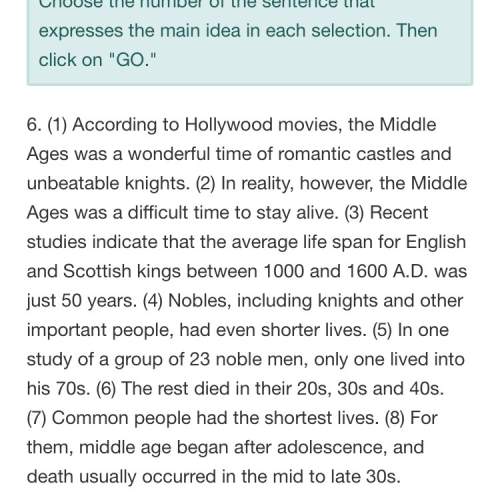
English, 30.06.2019 11:00 hkcapricorn7705
Read this passage from chapter 22 of the prince. there were none who knew messer antonio da venafro as the servant of pandolfo petrucci, prince of siena, who would not consider pandolfo to be a very clever man in having venafro for his servant. because there are three classes of intellects: one which comprehends by itself; another which appreciates what others comprehended; and a third which neither comprehends by itself nor by the showing of others; the first is the most excellent, the second is good, the third is useless. therefore, it follows necessarily that, if pandolfo was not in the first rank, he was in the second, for whenever one has judgment to know good and bad when it is said and done, although he himself may not have the initiative, yet he can recognize the good and the bad in his servant, and the one he can praise and the other correct; thus the servant cannot hope to deceive him, and is kept honest. how does the text structure the author convey his central idea that a prince is judged by the quality of his servants? by explaining the prince of siena’s reasons for choosing antonio da venafro as his servant by suggesting a solution to the problem of princes having to select intelligent and honest servants by providing supporting evidence of a prince believed to be clever because he chose a good servant by comparing and contrasting the qualities of pandolfo petrucci with those of his servant antonio da venafro

Answers: 1
Another question on English

English, 22.06.2019 02:00
How does frost use ambiguity to present his message about walls and neighbours what evidence supports the idea that the speaker believes good fences make good neighbors what details suggest the opposite
Answers: 2

English, 22.06.2019 02:40
Read the passage from sugar changed the world. sugar is a taste we all want, a taste we all crave. people throughout the planet everywhere have been willing to do anything, anything at all, to get that touch of sweetness. we even know exactly how thrilling it was to taste sugar for the first time. when the lewis and clark expedition met up with the shoshone, who had little previous contact with old world products, sacagawea gave a tiny piece of sugar to a chief. he loved it, saying it was "the best thing he had ever tasted." sugar created a hunger, a need, which swept from one corner of the world to another, bringing the most terrible misery and destruction, but then, too, the most inspiring ideas of liberty. sugar changed the world. we begin that story with a man who could never know enough. how does the conclusion of the prologue support the authors’ purpose? select two options. it introduces the topic that will be addressed next. it provides information about the authors. it states why the topic is relevant to readers. it cites sources the authors used in the text. it explains how the authors came to study the subject.
Answers: 1

English, 22.06.2019 04:30
What is the author's purpose in both patrick henry's speech and thomas paines common sense
Answers: 2

English, 22.06.2019 08:40
When should evidence be quoted directly and when should it be paraphrased? identify which approach the student in each scenario should use. paraphrase or quote for each box.
Answers: 1
You know the right answer?
Read this passage from chapter 22 of the prince. there were none who knew messer antonio da venafro...
Questions


English, 23.04.2021 16:30






Chemistry, 23.04.2021 16:30



Mathematics, 23.04.2021 16:30

Mathematics, 23.04.2021 16:30

Chemistry, 23.04.2021 16:30




Computers and Technology, 23.04.2021 16:30






